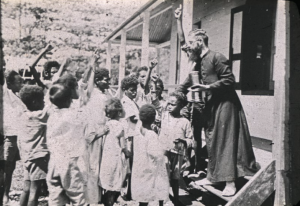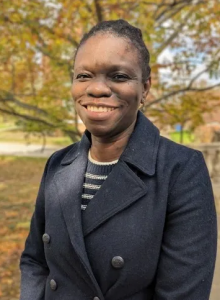The annual McClure Lecture in World Mission and Evangelism at Pittsburgh Seminary honors the Rev. Dr. W. Don McClure, a 1934 graduate of the Seminary who served as a missionary in Africa for nearly 50 years. The lectures are intended to enhance the worldwide mission of the church. In even-numbered years, the lecture also serves as a keynote address for the World Mission Initiative Conference.
The theme of the 2024 McClure Lecture and WMI Conference is “Mission in the Margins”: an exploration of how God is particularly active both from and in the margins of society. In the emerging landscape of mission, refugees, migrants, and the church in the Global South—traditionally viewed as recipients of mission goods and services—have become a major source of innovation and leadership in the founding of new worshipping communities, the provision of community services, and the work of advocacy for justice around the world.
The event will feature keynote speaker Dr. Harvey Kwiyani, a Malawian theologian currently serving as CEO of Global Connections, a network of some of the largest evangelical mission agencies in the United Kingdom. He leads a master’s program exploring diasporas in world Christianity at Church Mission Society and has authored several books, including Sent Forth: African Missionary Work in the West and Multicultural Kingdom: Ethnic Diversity, Mission and the Church. Attendees will also hear from the Rev. Cornell Jones, director of street outreach/group violence intervention coordinator for the City of Pittsburgh. Rev. Jones will share about about preparing for front-line ministry from his 30 years of peacebuilding experience.
PTS hopes that you will join us for this event!
– Sarah Betzig ’21, Communications Strategist, Pittsburgh Theological Seminary
Mission in the Margins: Lessons and Practices from the Global Church

Many countries in the Global South have a history of colonialism. Places such as Africa, parts of Asia, Latin America, and the Caribbean share this history. Sadly, the Christian religion has been a mechanism in the process of conquest and control. Missionaries were recruited to partner with the colonizers; their prerogative was to “save the souls” of those who came under their influence. Mission outposts were established and supervised by missionary departments in many judicatories. The goal of these departments was to support the work in those areas, mostly in the form of supplying clergy. The idea, then, that “mission” targets people in faraway places, as well as people who are inferior, poor, uncultured, uncivilized, and marginalized, is widely held.
The grit and purpose that churches in the Global South demonstrate today, in spite of their marginalized position, is worth highlighting. Local leadership has emerged, numerical and spiritual growth can be seen, there is creativity in raising funds to support the work and sustain programs, and in the midst of injustice and uncertainty, people are hopeful and persevering. There is an emphasis on spiritual nurture, faith sharing, interfaith dialogues, cross-cultural communications and evidence of diverse communities. These encapsulate the spirit of a “mission” which involves proclaiming the good news, caring for the sick, safeguarding the interest of the poor, promoting unity, and dismantling all forms of injustice.

The need for ongoing reflection on the Church throughout the world, then, is in no way an exercise in futility. Fledgling missions have now morphed into mature churches, which signals that long-cherished ideologies and practices regarding “missions” either have lost or are losing sway. The monopoly on missionary endeavors that churches in the Global North once enjoyed, and the propensity to behave as if mission is solely their prerogative, is now in focus. In places where missionaries sowed seeds, such seeds have taken deep roots. In many places, there is even an indigenizing of the church, where local folks have established and are supporting their churches without any kind of missionary support. These churches continue to serve their communities and respond in unique ways to the needs and concerns of the local people. By being aware of their own social location, by using language familiar to the people to talk about God, by incorporating their own experiences into their liturgy, and by engaging their own world through their own art forms, music, and popular culture—through their efforts to remain contextually relevant, these churches have remained vibrant.
The humility and willingness to learn from the global Church will now make mission more of a partnership endeavor, reciprocal in nature.

The loss of monopoly, then, is an indication that a paradigm shift is underway, and that shift is what this conference is seeking to highlight in our conversations about “Mission in the Margins” and what we can learn from the global Church. The humility and willingness to learn from the global Church will now make mission more of a partnership endeavor, reciprocal in nature. Those marginalized can no longer be excluded from the table, as they not only have a voice but are aware of their own needs. They might have limited financial resources; however, their active hope and the depth of their faith, even in the face of adversity, suggest they know who they believe in and are confident nothing is impossible when people put their trust in God.
Migration, the ease of travel, social media, and the media as a whole have shed light on the precarious state of churches in the Global North, particularly in the United States of America. People are coming to appreciate that low church attendance is not unique to their contexts, they are seeing materialism dampening the witness and vitality of the church, they are observing how the church is divided along political and racial lines and how other social issues are causing an implosion. The conclusion, then, is that churches in both the Global North and the Global South are facing unique challenges and must seize opportunities to learn from each other.
Mission in the margins recognizes that the mission we exercise is God’s.
Mission in the margins recognizes that the mission we exercise is God’s. This mission is geared not just toward people on the periphery but to those in the center. Mission is about justice, healing, and righteousness, and it seeks to break rather than perpetuate practices that dehumanize, oppress, and disregard the voices and concerns of those in the margins. Until all people stand in solidarity and follow the example of Christ in mission by affirming the dignity and well-being of all—not just some—people, we run the risk of losing out on the glorious harvest.
Register Here for the 2024 W. Don McClure Lecture and WMI Conference

The Rev. Natoya Thomas-Smith ’24 (Dip. Ed., Dip. Min., B.A., M.Div., M.T.S.) is the pastor of Oakmont United Methodist Church in Oakmont, Pa. She has served circuits in the Jamaica, Panama/Costa Rica, and South Caribbean Districts of the Methodist Church in the Caribbean and the Americas (MCCA) as a minister-in-training, and upon completing her ministerial training, she continued to serve in Eastern and Western Jamaica for 10 years, including time devoted to camping ministry. Rev. Thomas-Smith has served at the district level on the General Education, Christian Education, and Camps Planning Committees and has has helped prepare liturgies for districtwide use. Since coming to Pittsburgh, she has worked in higher education at Carnegie Mellon University and as a chaplain with the Foundation of Hope. She holds an M.Div. (United Theological College of the West Indies), M.T.S. (Pittsburgh Theological Seminary), B.A. (Spanish Language and Literature; University of the West Indies, Mona), and post graduate diplomas in Education and Training and in Ministerial Studies (United Theological College of the West Indies). When not attending to the circuit food pantry or the weekly radio program she co-hosts with her husband, Rev. Thomas-Smith enjoys camping, board games, and sightseeing.
References:
Buhle Mpofu. “Mission on the margins: A proposal for an alternative missional paradigm in the wake of COVID-19” HTS Teologiese Studies/Theological Studies (2020): file:///C:/Users/user/Downloads/ajol-file-journals_339_articles_212982_submission_proof_212982-4045-526657-1-10-20210819.pdf
Keum, J. “Together towards life: Mission and evangelism in changing landscapes, with a practical guide,” World Council of Churches Publications, Geneva (2013): https://www.oikoumene.org/sites/default/files/Document/Together_towards_Life.pdf
Watty, William, “Preaching on International Missions: A Third World View,” The United Theological College of the West Indies, Kingston Jamaica
Read Next








